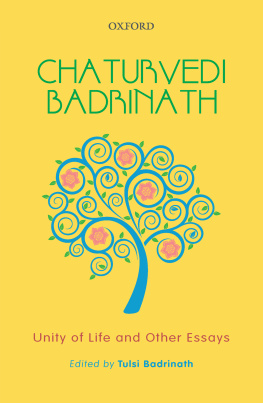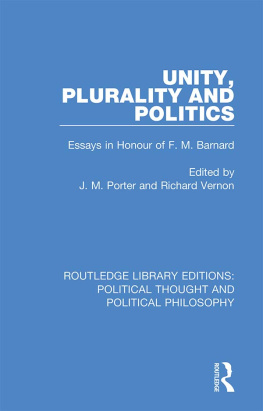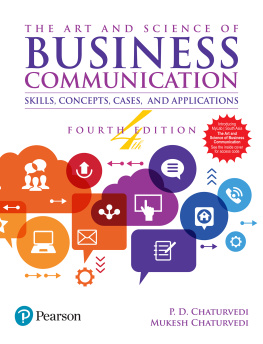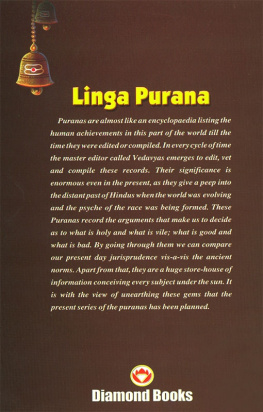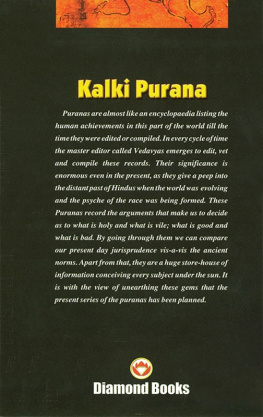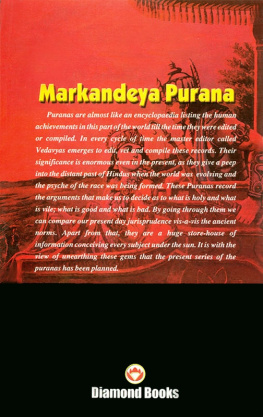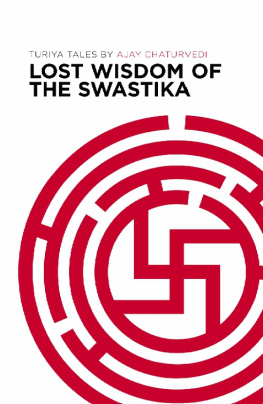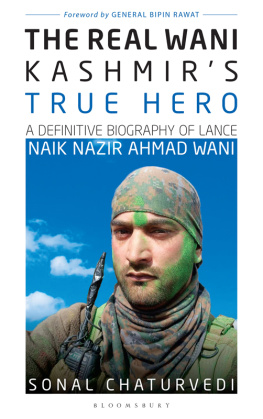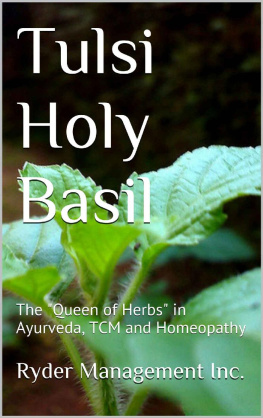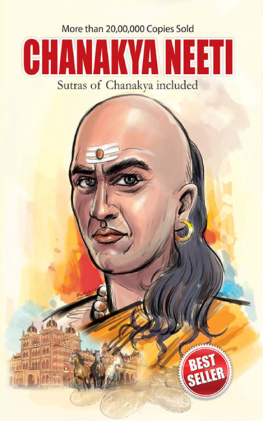Tulsi Badrinath - Chaturvedi Badrinath: Unity of Life and Other Essays
Here you can read online Tulsi Badrinath - Chaturvedi Badrinath: Unity of Life and Other Essays full text of the book (entire story) in english for free. Download pdf and epub, get meaning, cover and reviews about this ebook. year: 2017, publisher: OUP India, genre: Politics. Description of the work, (preface) as well as reviews are available. Best literature library LitArk.com created for fans of good reading and offers a wide selection of genres:
Romance novel
Science fiction
Adventure
Detective
Science
History
Home and family
Prose
Art
Politics
Computer
Non-fiction
Religion
Business
Children
Humor
Choose a favorite category and find really read worthwhile books. Enjoy immersion in the world of imagination, feel the emotions of the characters or learn something new for yourself, make an fascinating discovery.
- Book:Chaturvedi Badrinath: Unity of Life and Other Essays
- Author:
- Publisher:OUP India
- Genre:
- Year:2017
- Rating:5 / 5
- Favourites:Add to favourites
- Your mark:
- 100
- 1
- 2
- 3
- 4
- 5
Chaturvedi Badrinath: Unity of Life and Other Essays: summary, description and annotation
We offer to read an annotation, description, summary or preface (depends on what the author of the book "Chaturvedi Badrinath: Unity of Life and Other Essays" wrote himself). If you haven't found the necessary information about the book — write in the comments, we will try to find it.
Chaturvedi Badrinath: Unity of Life and Other Essays — read online for free the complete book (whole text) full work
Below is the text of the book, divided by pages. System saving the place of the last page read, allows you to conveniently read the book "Chaturvedi Badrinath: Unity of Life and Other Essays" online for free, without having to search again every time where you left off. Put a bookmark, and you can go to the page where you finished reading at any time.
Font size:
Interval:
Bookmark:
I would like to thank The Times of India for granting permission to use Chaturvedi Badrinaths essays in this book.
I appreciate the great care taken by the editors of Oxford University Press over every aspect of this book. Thanks also to Mini Krishnan for her enthusiasm and support.
I thank Jyotirmaya Sharma for all his help and generosity of spirit.
Lastly, I am grateful to my son Chinmaya for being so helpful at every stage.
Human beings have at all times claimed that self-interest is the spring of all that they do, that what they do has happiness as its aim, and there is perhaps no man or woman who remains untroubled by the question of truth in one form or another. What we do as individuals, we do as societies and nations. The underlying processes of the two are the same.
Then why is it that we mostly live our lives, individually and collectively, in ways that are visibly against our self-interest? At all times concerned with the truth of situations and of persons, we never cease to craft intricate webs of untruth. In the place of happiness and joy, we create suffering and pain. Why?
These questions are by no means new. What is new is the collapse of practically every modern theory that claims to answer them. That collapse is manifest everywhere today, in practical terms and not in the world of ideas alone. The truth of the matter is that a great many of the explanations of the human condition themselves created situations of more conflict, a still deeper enslavement of the mind, and destruction of millions of human lives, when in fact they had set out in different ways to create a world of freedom and joy. This may be called the scandal of philosophy.
What may be called the scandal of religion has been no less. It was against that scandal in the first place that modern philosophy, the new Enlightenment, had established itself. The one ground that is common to all religions, about which at least there is little dispute, is the belief that all human disorders arise from mans worship of himself; that man must submit in the worship of God; for, in that worship, man finds himself and all men are equal. There is no doubt that there have been at all times men and women who lived their lives in that way. But also there can be no denying that organised religions very soon put the vocal man in the place of silent God. Man would claim that he knew the mind of God; would put forth his interpretation of it as the truth of human life; would seek to control human relationships on that basis; and would destroy, if he could, whoever questioned it. Despite their protestation to the contrary, religions have mostly worshipped the fragmented man and rarely the unity of God. This is the scandal of religion.
What is also new is the open advocacy of market as the ultimate reality of human life. Earlier, its workings were masked, by the masks of civilisation, philosophy and religion and the arts, but sometimes they were hidden altogether. Just as any open talk of sex, and of sex relations, was thought to be crude and vulgar, no one talked of money and of money relations openly. But now the global market is in its full light as the new God; its worship, the only path to good life. In being its own philosophy and religion, it now seeks no justification beyond the demands of its own existence.
To the priestly order of the global market, what is worrisome, however, is the fact that whereas in its kingdom truth and happiness are no real values, in the ordinary lives of a vast number of men and women, they remain their chief quest. The human spirit refuses to be managed as regards truth and untruth. What will be fatal to this worship of global market is already present at the heart of it: the fact that it negates the very reality it avows the mostself-interest.
That is what a great many of us do anyway, but seek happiness none the less, often desperately, which takes very many forms. Whatever may be those forms, if one achieved well-being and happiness, in whatever measure, one would, in that measure, radiate happy energy. That is not what happens often, although it is not rare either. What mostly happens, individually and socially, is that we keep moving in a never-ending circle of disenchantment and hope. We are disappointed, sometimes greatly, in the thing, or the person, or the idea, or the cause, which we believed would bring well-being and happiness but brought their very opposite in actual fact. Refusing to be discouraged, for mostly we refuse to believe that we could be so very mistaken, we then either cling to them in hope, or move on to another thing, or another person, or another idea, or cause, or we do both in parts, with more or less the same results as before.
We are then apt to conclude, supported by a certain kind of philosophy or religion, that it is mans destiny to rotate in the cruel and relentless wheel of disenchantment. And that the only way to gain release from it is to abjure experience altogether. Or we throw ourselves recklessly into the streams of events. Or we do both in many different degrees. A very central part of Indian thought shows how very harmful both are.
view of human emotions and the mind. They show that the world is not by its nature a dismal place, nor is man condemned to pain and suffering. They show how, in our personal and collective existence, we can as well create fields of happy energy, if only we understand what self-interest and truth truly are. Their voice is of the greatest meaning to the world today.
First published in The Times of India on 27 December 1994.
This is a key period between the seventeenth and eighteenth centuries in European intellectual history that emphasized the use and necessity of Reason in understanding the natural world, which led to widespread revolution and reform, especially when applied to the individual, religion, and the authority of the church, but also in areas of philosophy, political theory, science, and mathematics.
The longest epic in the world, of around 100,000 sloka-verses in Sanskrit, dictated by Sage Vyasa to Ganesha, of which certain parts can be dated to around the 1000 bce , while its core dates even further back, perhaps to the third millennium. Comprising of 18 chapters or parvas, the Mahabharata presents the story of a war that grew out of the bitter rivalry of cousins for the throne of Hastinapura. However, woven within the cycle of stories within a story are long discussions on the qualities of a king, his dharma, the attributes of what dharma is, time, fate, self-interest, and moksha. For a detailed work on its essence, read Badrinaths The Mahbhrata: An Enquiry in the Human Condition (2006), which was awarded the Sahitya Akademi Award in 2009.
This is derived from the Sanskrit root jina or conqueror and pertains to Jainism, founded around the fifth or sixth century bce . It can refer to laymen and ascetics who follow the precepts, or to the world view itself, of Jainism.
What self-interest, truth, and happiness are, is to be known not by any one theory of them but by the innate rhythms of life. This is the very first thing which the Mahabharata suggests. But it is also the one thing that is seldom recognised. The problem with theory, with theory as such, is that it begins with a conclusion which appears to be a hypothesis but is, in fact, a certainty. And since there have always been many theories about the same thing, one conflicting with the other, it means that there are as many conflicting certainties. Human history shows that, by some mysterious transformation, they turn into a luxurious ground for violence of every variety.
This problem is brought up in Mahabharata in the form of a parable. A group of sages approach Brahma, recount the various theories of what the Good is, each of them claiming
Font size:
Interval:
Bookmark:
Similar books «Chaturvedi Badrinath: Unity of Life and Other Essays»
Look at similar books to Chaturvedi Badrinath: Unity of Life and Other Essays. We have selected literature similar in name and meaning in the hope of providing readers with more options to find new, interesting, not yet read works.
Discussion, reviews of the book Chaturvedi Badrinath: Unity of Life and Other Essays and just readers' own opinions. Leave your comments, write what you think about the work, its meaning or the main characters. Specify what exactly you liked and what you didn't like, and why you think so.

